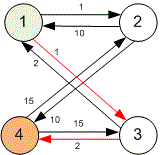Redaksiya
Let be the cost of gasoline in the -th city. For each pair of cities and , add a directed edge from to with weight , as well as a directed edge from to with weight .

To solve the problem, find the minimum cost path from city to city .
Example
Let’s construct the graph given in the first example.

The minimum cost route from vertex to vertex is: . Its cost is .
Algorithm realization
Store the graph in an adjacency matrix . The current shortest distances from the starting vertex to the other vertices are stored in an array . The array holds the gasoline cost in each city.
#define MAX 110 #define INF 0x3F3F3F3F int g[MAX][MAX], used[MAX], d[MAX], cost[MAX];
Read the number of cities and the gasoline cost in each of them.
scanf("%d",&n);
for(i = 1; i <= n; i++)
scanf("%d",&cost[i]);Construct a graph representing the costs of traveling between cities.
memset(g,0x3F,sizeof(g));
memset(used,0,sizeof(used));
scanf("%d",&m);
for(i = 1; i <= m; i++)
{
scanf("%d %d",&a,&b);
g[a][b] = cost[a];
g[b][a] = cost[b];
}Initialize the shortest distances from the first vertex to the other vertices.
memset(d,0x3F,sizeof(d)); d[1] = 0;
Start the loop of Dijkstra's algorithm. In each iteration find the vertex with the minimum distance from the starting vertex.
for(i = 1; i < n; i++)
{
mind = INF; w = -1;
for(j = 1; j <= n; j++)
if (!used[j] && d[j] < mind) {mind = d[j]; w = j;}If it turns out that , then the desired path does not exist, and we exit the loop.
if (w < 0) break;
Relax all edges originating from vertex .
for (j = 1; j <= n; j++)
if (!used[j]) d[j] = min(d[j], d[w] + g[w][j]);The shortest distance to vertex is computed.
used[w] = 1; }
Print the answer based on the value of . If it is infinity, then there is no path to vertex . Otherwise, print the shortest distance found.
if (d[n] == INF) printf("-1\n");
else printf("%d\n",d[n]);Java realization
import java.util.*;
public class Main
{
static final int INFINITY = 2000000000;
static int g[][], used[], dist[], cost[];
static void Relax(int i, int j)
{
if (dist[i] + g[i][j] < dist[j])
dist[j] = dist[i] + g[i][j];
}
public static void main(String[] args)
{
Scanner con = new Scanner(System.in);
int n = con.nextInt();
g = new int[n+1][n+1];
for (int[] row: g) Arrays.fill(row, INFINITY);
cost = new int[n+1];
for (int i = 1; i <= n; i++)
cost[i] = con.nextInt();
used = new int[n+1]; Arrays.fill(used, 0);
dist = new int[n+1]; Arrays.fill(dist, INFINITY);
dist[1] = 0;
int m = con.nextInt();
for (int i = 1; i <= m; i++)
{
int a = con.nextInt();
int b = con.nextInt();
g[a][b] = cost[a];
g[b][a] = cost[b];
}
for (int i = 1; i < n; i++)
{
// find vertex w with minimum d[w] among not used vertices
int min = INFINITY, v = -1;
for (int j = 1; j <= n; j++)
if (used[j] == 0 && dist[j] < min) { min = dist[j]; v = j; }
// no more vertices to add
if (v < 0) break;
// relax all edges outgoing from v
// process edge v -> j
for (int j = 1; j <= n; j++)
if (used[j] == 0 && g[v][j] != -1) Relax(v, j);
// shortest distance to v is found
used[v] = 1;
}
if (dist[n] == INFINITY) System.out.println(-1);
else System.out.println(dist[n]);
con.close();
}
}